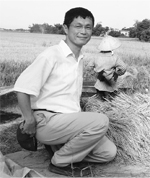Japan's Official Development Assistance White Paper 2007
Column 8 Towards Environmentally Friendly Rural Development Using Charcoal
— Bach Ma National Park, Viet Nam —
For a three-year period commencing in January 2008, the Tokyo University of Agriculture and Technology plans to launch a project that aims to spread technologies utilizing coal for residents in the buffer zone*1 of Bach Ma National Park in Viet Nam, and to improve the income of residents while promoting their coexistence with nature. The project applied to be a JICA Partnership Program*2 and was selected in 2007.
The project site, Bach Ma National Park, was proposed for a World Natural Heritage site in 2006. Roughly 80,000 residents live around the park, and most work as farmers. However, these residents do not enjoy a high level of income, living on ¥2,000 to ¥4,000 a month. As many of these residents cut down trees in the park for use as firewood, the issue of balancing environmental preservation in the national park and the lifestyles of its residents had arisen. Thereupon, the use of coal made from agricultural waste and improved furnaces*3 has been proposed.
After a preliminary field survey by related individuals from the Tokyo University of Agriculture and Technology, it was revealed that a plethora of agricultural waste materials (chaff, coconut husk, corn cobs, etc.) were left unattended in the area. It is possible to reduce the amount of firewood and the number of trees cut down by carbonizing these agricultural waste materials and using them as fuel. Moreover, it will be more effective if a furnace with high thermal efficiency is introduced. Also, applying coal and wood acids generated from agricultural crops during the carbonization process will serve to grow healthy crops and reduce soil and water pollution, even if chemical fertilizer and pesticide usage is decreased. This will also reduce labor required for collecting firewood and the cost of purchases of agricultural materials. An increase in revenue can also be anticipated by selling vegetables and fruits with the added value of being grown organically.
Thus, a preliminary explanation was provided to the local residents regarding the details, expected effects and possibilities of the project. As a result, there were many that expressed their concern about health issues and the pollution of wells induced by the continuing use of large quantities of pesticides and chemical fertilizers. Many also noted that they would be keen to participate in the project if the process can increase production of safe crops, and improve their lifestyles with the use of coal and wood acids. These comments signify the level of expectations surrounding, and interest in this project. Nguyen Vu Linh, Director of the Environmental Education and Ecotourism Center of Bach Ma National Park, who studied at the Tokyo University of Agriculture and Technology, offered to serve as a mediator between the university and local residents; this will be a tremendous help in successfully carrying out this project.
In response to a question on concerns regarding the implementation of the project, Professor Hiroaki Yamada of the Tokyo University of Agriculture and Technology says, "What we are going to do in this project is something that has been validated throughout the world over and over again. Therefore, I am sure that it will prove successful. I also believe that the most important thing is to provide the local residents with at least one visible result that they can comprehend firsthand."
It appears as if there will never be enough time for further preliminary surveys and preparations before the project start. How will results show themselves over the next three years? Steady preparations are underway at the Tokyo University of Agriculture and Technology in efforts for local residents to feel the simultaneous achievement of the quality of life and environmental preservation.

Professor Yamada conducting field survey



 Next Page
Next Page